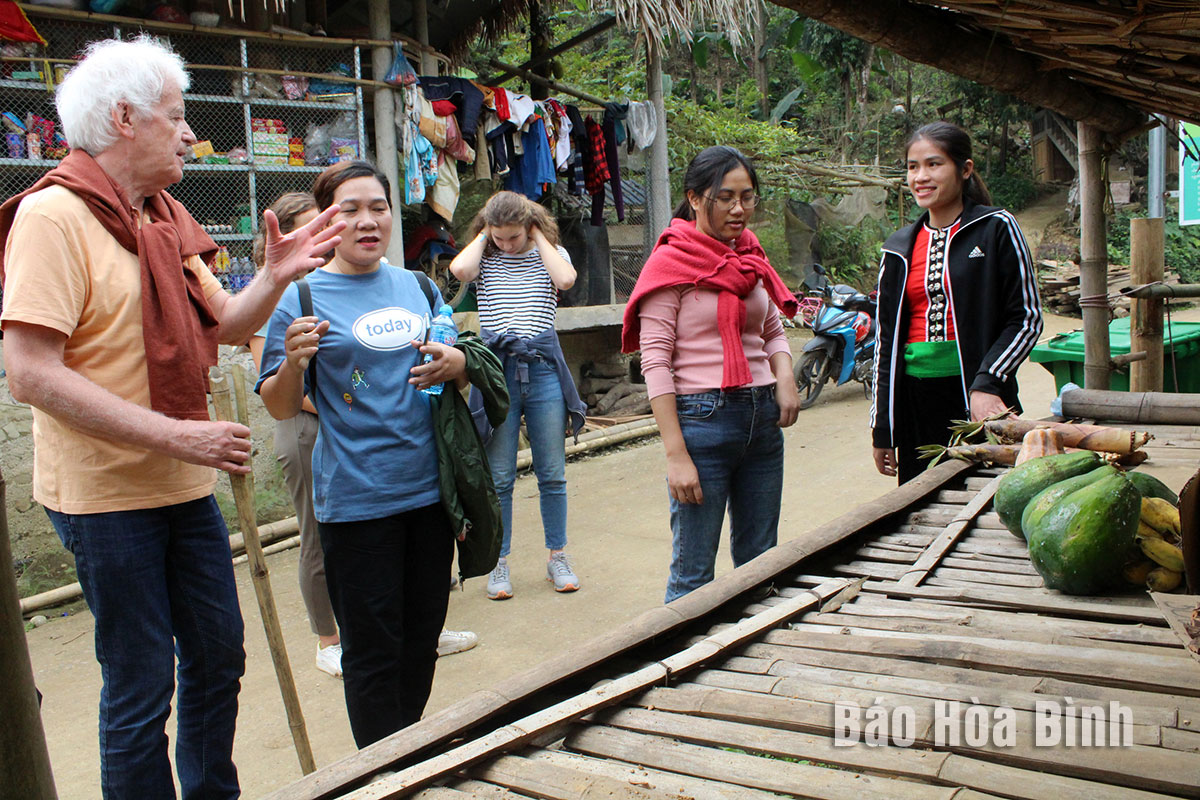
Da Bia hamlet, now Duc Phong, in Tien Phong commune, Da Bac district, was once almost isolated from the outside as the only way to the hamlet was to get a boat ride across the Hoa Binh reservoir. However, as its tourism potential has been unleashed, the hamlet has established itself as one of the most attractive destinations on the tourism map. It has even received the ASEAN Community-Based Tourism Awards in 2019.

Bui
Thi Nhem (R), who is running a homestay in Duc Phong, briefing tourists on the
self-service shop model.
Ban Thi Kim Quy, Vice Chairwoman of the district
People's Committee, stressed that the beautiful natural landscapes, rich
culture, and changing mindset have helped turn tourism into a key economic
sector, generating numerous jobs and improving living standards, particularly for
ethnic minority communities.
This transformation is evident not only in Duc Phong
but also in other hamlets engaging in community tourism throughout the
district, she said, taking the example of Sung hamlet in Cao Son commune, which
has emerged to a bright spot in community tourism from a poor, isolated
locality.
According to Ly Sao Mai, from Da Bac Community-Based
Tourism JSC in Sung hamlet, among the 75 Dao households there, only a few are
currently running homestays, while the others have actively contributed to
local tourism development by offering products and tour guide services.
Quy said over the past years, apart from
implementing action programmes and plans on community tourism, the district has
paid attention tourism promotion, market connectivity, and brand building.
The district expects to welcome 550,000 visitors by
2025, of them 25,000 international, and earn over 297 billion VND (11.91
million USD) from the tourism sector.
Located just a 20-minute drive from Hoa Binh City, Ora Hill Farmstay & Glamping Hoa Binh is a captivating new destination nestled in Mo hamlet, Bình Thanh commune, Cao Phong district. Combining farming with leisure, this tranquil retreat is perfect for those seeking balance, joy, and an immersive experience in the expansive beauty of nature.
Muong Bi - Tan Lac is renowned as one of the four famous Muong regions in Hoa Binh province. Blessed by nature with a favourable climate and stunning landscapes, Tan Lac holds great advantages for tourism development. The local tourism industry has made remarkable strides in recent times thanks to the attention and support from the local authorities and sectors.
With its strategic location, well-developed transport network, and diverse soil and climatic conditions, Hoa Binh is emerging as a must-visit destination in Vietnam's northwestern tourism corridor. The province boasts numerous attractions, including the Kim Boi hot springs (Kim Boi district), the Dau Rong cave complex (Cao Phong), the Mai Chau valley (Mai Chau), and the iconic Hoa Binh hydropower plant.
The northern mountainous province of Hoa Binh has been listed among the 71 most beautiful places to visit worldwide by the prestigious US travel magazine Condé Nast Traveller.
Hoa Binh province’s rich natural and cultural resources position it as a prime location for developing community-based tourism (CBT). In recent years, support from central and provincial policies, as well as assistance from non-governmental organisations, have encouraged local ethnic minority and mountainous communities to actively engage in the sector.



